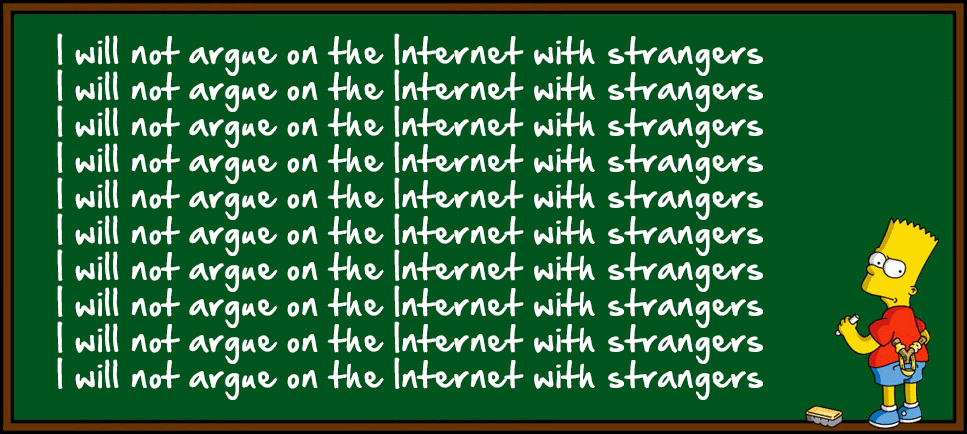I’ve developed a dangerous new habit over the past couple years.
I suppose that, at least in comparison to other addictions, mine isn’t overly harmful. It lacks the cancerous agents found in cigarettes, the price tag that comes with being addicted to online shopping, or the liver damage caused by alcoholism. When directly compared to any of the above, arguing with strangers on the Internet seems like an extracurricular more than anything. However, it’s become a real threat to my downtime and general sense of contentment.
I grew up with the Internet as a large part of my life. I was the family member that other family members yelled at for bogarting the house’s one phone line, chatting to acquaintances over MSN Messenger, and discussing just how great Evanescence was through Nexopia forums. My Internet usage was pretty tame compared to some, as I never became that into posting things online and stuck to the social media platforms I knew. I was always more of an observer than a commenter—and it wasn’t until recently that I realized how valuable of a difference that was.
I think it all started during the rise of planking. Or maybe we could trace it all the way back to Black “Friday.” Whatever ground zero of my obsession with online arguing was, it doesn’t matter. More recently my opinions have revolved around things like NekNominations and the never-ending controversy over Woody Allen’s Cecil B. DeMille Award. I couldn’t help myself when someone posted the article by Lindsay Bottos about how “The act of women taking selfies is inherently feminist,” opting to rant about Bottos’ absurd comparison instead of being the person who just closes their laptop and walks away. People making comments that have already been made a thousand times over are what keep these trends in the spotlight.
I’m not saying people shouldn’t be voicing their opinions through Facebook. You can do whatever you want with your profile and if that means scrapbooking a bunch of different articles from around the Internet to convey your own viewpoints, woohoo for you. Just remember that no one is cruising their newsfeed to have an epiphany. Ninety-nine per cent of the time a discussion comes up on Facebook, it’s going to dissolve into a back and forth between a handful of individuals who are already too engrained in their opinions to even consider another side; this is the best case scenario. The worst case scenario is an instantaneous insult-war about how a person spelled a word wrong or used incorrect grammar. Humans have come a long way in some instances, and yet in other ways we haven’t.
Generally speaking, I support having a dialogue for people to exchange their opinions. Censorship bad, freedom of speech good, yada yada. But sometimes you have to sever the communication connection for people’s own good. The Other Press’ website is a great example of how I feel about online commenting. We currently have 366,314 comments awaiting approval and I can all but guarantee that most of them are from spammers. We’ve discussed adding a commenting section to the website where it connects to a person’s Facebook, but I honestly don’t see how much good it would do. People can comment when the article is posted to our Facebook page; section editor emails are included in the newspaper if someone wants to write a letter to the editor (which I encourage people to do!); and if you’re really feeling steamed about a certain topic, why not contribute an article yourself? It doesn’t take much to take an opinion and turn it into a piece for the newspaper, and then you can continue the cycle of someone’s viewpoints coming into contrast with someone else’s.
Back to my own personal affliction with Internet commenting, I thankfully have been able to restrict my vocalizations to Facebook, so I’m at least not opening a Pandora’s box. Having your own opinions is great; having opinions that go against the grain are even better. Just please find a constructive way to channel your expressions instead of just bloating someone else’s Facebook status. Start a blog, join Twitter, or even just save your thoughts for a conversation IRL. At least your friends will be more forgiving of your terrible grammar.


